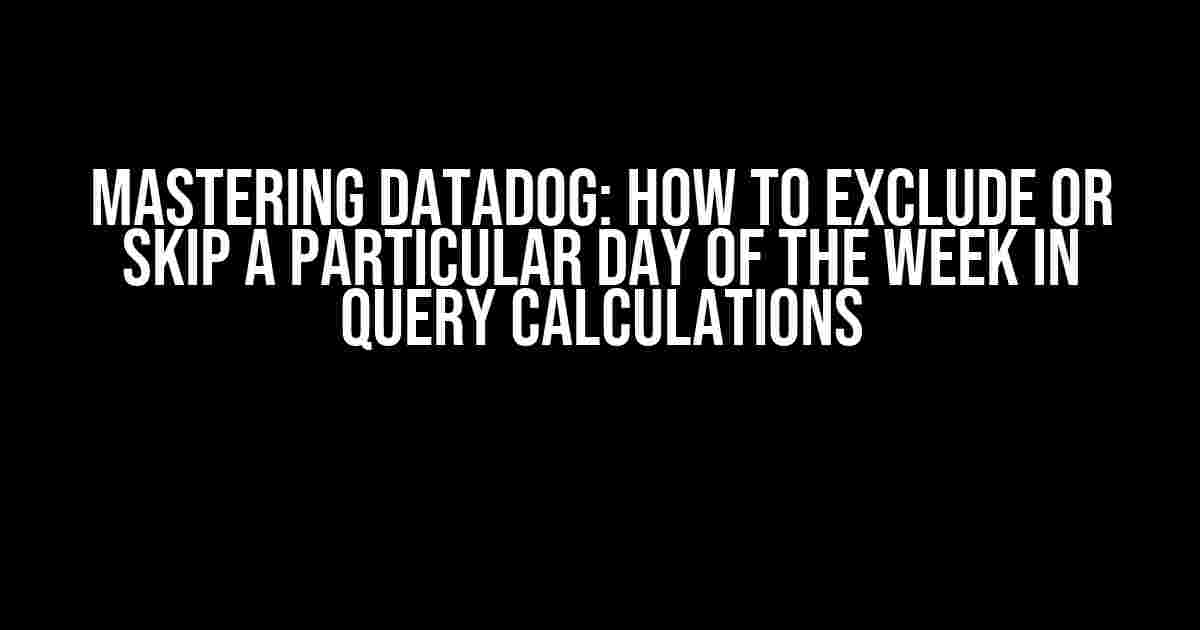Are you tired of dealing with irrelevant data in your Datadog queries? Do you want to focus on specific days of the week, excluding others that don’t add value to your analysis? Look no further! In this article, we’ll dive into the world of Datadog query calculations and show you how to exclude or skip a particular day of the week with ease.
Understanding the Need to Exclude Days of the Week
In many cases, certain days of the week might not be relevant to your data analysis. For instance, if you’re analyzing website traffic, you might want to exclude Sundays, when traffic tends to be slower. Or, if you’re a retailer, you might want to skip Mondays, when sales are typically lower. Whatever the reason, being able to exclude specific days of the week can greatly improve the accuracy and relevance of your data insights.
The Magic of Datadog’s Date Functions
Datadog provides an array of powerful date functions that can be used to manipulate and filter data based on specific dates or date ranges. To exclude a particular day of the week, we’ll be leveraging the `date` and `day_of_week` functions.
The `date` Function
The `date` function is used to extract a specific date component from a timestamp. In our case, we’ll be using it to extract the day of the week.
date(())
Here, `
The `day_of_week` Function
The `day_of_week` function returns the day of the week as an integer, where:
- Sunday = 0
- Monday = 1
- Tuesday = 2
- Wednesday = 3
- Thursday = 4
- Friday = 5
- Saturday = 6
day_of_week(())
Again, `
Excluding a Particular Day of the Week: The Syntax
To exclude a particular day of the week, you can use the following syntax:
sum() as ''
filter
(day_of_week(date()) != )
Here:
Examples and Use Cases
Let’s explore some examples and use cases to illustrate the power of excluding specific days of the week in Datadog queries.
Example 1: Exclude Sundays from Website Traffic Analysis
sum(requests) as 'Requests_Excluding_Sunday'
filter
(day_of_week(date(timestamp)) != 0)
In this example, we’re calculating the total number of requests, excluding Sundays.
Example 2: Skip Mondays from Sales Analysis
sum(sales) as 'Sales_Excluding_Monday'
filter
(day_of_week(date(timestamp)) != 1)
Here, we’re calculating the total sales, excluding Mondays.
Example 3: Exclude Weekends from Server Uptime Analysis
sum(uptime) as 'Uptime_Excluding_Weekends'
filter
(day_of_week(date(timestamp)) != 0 && day_of_week(date(timestamp)) != 6)
In this example, we’re calculating the total uptime, excluding both Saturdays and Sundays.
Best Practices and Additional Tips
When excluding specific days of the week in Datadog queries, keep the following best practices and additional tips in mind:
- Use descriptive aliases**: Use meaningful aliases for your calculated metrics to ensure clarity and readability in your dashboards and reports.
- Test and validate**: Test your queries and validate the results to ensure you’re getting the desired outcome.
- Consider using aggregation**: If you’re dealing with large datasets, consider using aggregation functions (e.g., `rollup`, `groupby`) to reduce the data volume and improve performance.
- Use the correct timestamp column**: Make sure to use the correct timestamp column in your query, as this can affect the accuracy of your results.
- Document your queries**: Document your queries and share them with your team to ensure knowledge sharing and reproducibility.
Conclusion
In this article, we’ve demonstrated how to exclude or skip a particular day of the week in Datadog query calculations using the `date` and `day_of_week` functions. By mastering these techniques, you’ll be able to create more targeted and accurate data insights, improving your understanding of your data and driving more informed business decisions.
| Day of the Week | Integer Value |
|---|---|
| Sunday | 0 |
| Monday | 1 |
| Tuesday | 2 |
| Wednesday | 3 |
| Thursday | 4 |
| Friday | 5 |
| Saturday | 6 |
Remember to bookmark this article and share it with your team to ensure everyone is equipped with the knowledge to exclude specific days of the week in Datadog queries.
Here are 5 Questions and Answers about “How to exclude or skip a particular day of the week in the query calculation in Datadog”:
Frequently Asked Question
Hey there, Datadog enthusiast! Are you tired of dealing with pesky days of the week messing up your query calculations? Worry no more, we’ve got you covered! Here are some frequently asked questions about excluding or skipping particular days of the week in Datadog.
Q1: How do I exclude Sundays from my query calculation in Datadog?
You can use the `date Partiql` function to exclude Sundays from your query calculation. For example, `sum:metric{!date_part(‘dow’, timestamp) = 0}` will exclude Sundays (which are represented by 0 in the `dow` function) from your calculation.
Q2: Can I skip multiple days of the week in my query calculation?
Yes, you can! You can use the `NOT IN` operator to exclude multiple days of the week. For example, `sum:metric{!date_part(‘dow’, timestamp) NOT IN (0, 6)}` will exclude both Sundays (0) and Saturdays (6) from your calculation.
Q3: How do I exclude weekdays (Monday to Friday) from my query calculation?
You can use the `NOT IN` operator again! `sum:metric{!date_part(‘dow’, timestamp) NOT IN (1, 2, 3, 4, 5)}` will exclude weekdays (Monday to Friday, represented by 1 to 5) from your calculation.
Q4: Can I use this method for aggregate queries like `avg` or `max`?
Yes, this method works for aggregate queries as well! Just make sure to apply the filter before the aggregation function. For example, `avg:metric{!date_part(‘dow’, timestamp) != 0}` will calculate the average of `metric` excluding Sundays.
Q5: Are there any performance considerations when excluding days of the week in my query calculation?
While excluding days of the week can be a powerful filtering technique, it may impact query performance, especially if you’re dealing with large datasets. Be mindful of the query complexity and test your queries thoroughly to ensure optimal performance.

